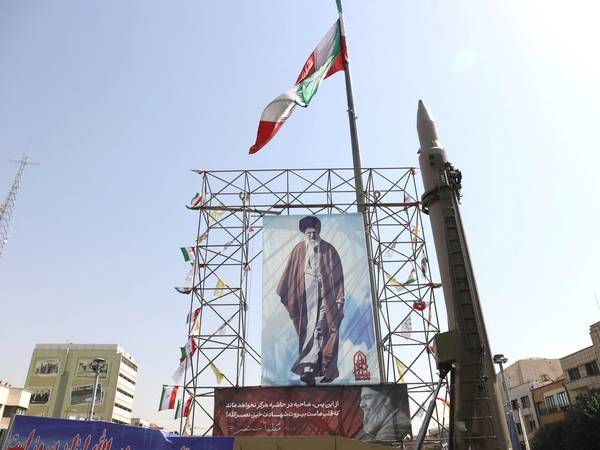In the wake of Iran's massive but largely ineffectual missile barrage, Israel has arrived at a critical crossroads that will test its ambition in dealing with its mortal enemy.
All options carry grave consequences for the balance of power in the region and Israel's standing in an increasingly intense conflict flaring on multiple fronts.
Israel could heed US and international pleas for calm by downplaying the attack - just as it did when Iran launched its last missile volley in April - and hold off on a major response.
It might decide to target Iran’s political and military leadership, killing key figures as it has with Iran-backed Hezbollah in Lebanon.
In an even more extreme scenario, the Jewish state could take aim at Iran’s nuclear facilities, vital military sites, and economic infrastructure such as oil fields and refineries.
Still more devastating would be a combination of the last two options: an all-out strategy in which assassinations are paired with widespread destruction of military and economic infrastructure.
No perfect option
The first option is highly unlikely.
With the stakes so high, ignoring the attack may be seen from Israel as emboldening Iran and sending a message of weakness to its regional allies just as Israel appears to be gaining a military advantage, particularly in Lebanon.
The assassination route, while projecting unabashed strength, would not have a game-changing impact on the ground: Iran would quickly fill any personnel gaps with even more hardline cadres with redoubled hatred towards Israel.
The most extreme options also carry the most risks. Targeting Iran’s nuclear sites and infrastructure would almost certainly escalate into a full-scale war and drag the United States into the conflict - something both presidential hopefuls are on record as seeking to avoid.
The Hezbollah Factor
Iran has always been hopeful that if it faced a confrontation with Israel or the US, Hezbollah’s presence in Israel’s neighborhood would make them think twice.
But Iran’s deterrent force in Lebanon has now been significantly weakened by Israeli bombings and airstrikes. Israel systematically targeted and decimated Hezbollah’s leadership within two weeks, and its missile arsenal could be degraded next.
A hobbled Hezbollah would mean the end of Iran’s most effective deterrent force in the region. But might that lead Iran to pivot toward building a new deterrent? And what might this deterrent be other than a nuclear weapon?
This would be an enormous strategic setback for Israel and accelerate the very nightmare scenario it seeks to prevent.
One shot
For Israel, this moment presents a rare opportunity to deal a severe blow to Iran’s nuclear ambitions, one that it would be reluctant to pass up.
But the bigger question remains: Will President Joe Biden support Israel’s more aggressive actions, even if it means risking a new war in the Middle East?
The answer is far from simple. If the Biden administration doesn’t back Israel, the Democratic Party could appear feckless and weak, which may not help at polls. But if it chooses to support a military strike that cripples Iran, it could alienate the left wing of his party, potentially losing some progressive votes.
Such a move might also appeal to moderate Republicans who oppose Donald Trump, creating an unexpected coalition of support. Standing with Israel could also help guarantee the backing of the influential pro-Israel lobby in Washington.
Can Israel Truly Stop Iran's Nuclear Program?
Some experts believe that Iran’s nuclear program is too deeply entrenched underground for Israeli airstrikes to eliminate it entirely. While it’s true that Israel may not be able to completely destroy the program, a well-executed attack might delay it by a few years.
Furthermore, if Israel opts for a combined assault - targeting both Iran’s nuclear facilities and its leadership - it could wound the Islamic Republic to the point where it may no longer be able to rebuild its nuclear program. In this scenario, the collapse of the whole ruling system could become a real possibility.
Israel's response to Iran’s missile attacks will not only determine the future of the Middle East but also have profound implications for the US's role in the world.
The Biden administration will weigh its options carefully. A misstep could ignite a regional conflict with global consequences, but doing nothing might risk emboldening Iran and rattling the security of the region even more.
Iran’s Fragile State
For the Islamic Republic of Iran, the current situation is precarious. Supreme Leader Ayatollah Khamenei is 85 - and in declining health.
The theocratic 'system' narrowly survived a major uprising just two years ago, and the country's economic conditions have worsened significantly.
Millions of Iranians are grappling with severe economic hardship, while tens of thousands of government workers have protested in the streets over delayed salaries and unpaid wages.
Unemployment remains high, and less than three months ago, Iran held a presidential election that saw a record-low voter turnout, ushering in a president with an unprecedentedly weak mandate.
In this fragile state, and after suffering significant blows from Israel - including the assassination of Ismail Haniyeh in Tehran on the day of the new president’s inauguration - Iran finds itself much weakened.
The question now is: can the Ayatollahs contain the growing discontent within the country if it is drawn into a war?
